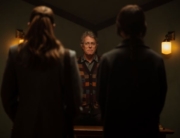Ali Abassi’s Border is the kind of film one hesitates to discuss, for fear of spoiling the surprise. That being said, I’m not sure what could prepare a viewer for a film so unique and unsettling. With a near-perfect balance of the quotidian and the fantastical, and a sophisticated grasp of character, Border is a haunting and unexpected exploration of otherness, the relationship between parents and children, and self-knowledge. Indeed, it is a film of unusual thematic density.
Based on a short story by John Adjvide Lindqvist (Let the Right One In), Border tells the story of Tina (Eva Melander), who works for the Swedish border agency and has an unusual, unconventional face that strangers comment upon. She lives in a house in the woods with a disheveled renter, her erstwhile boyfriend, who raises dogs, and has an uncanny, hypersensitive attachment to nature. She walks in the gorgeous, moss-covered woods by her home with a sense of bliss, eager to see animals, and embrace the sounds around her. Accustomed to how she looks and how it separates her from the outside world, she seems more or less resigned to the life she leads.
Tina also has an incredible sense of smell, which she uses to sniff out questionable contents lurking inside suitcases at the border agency and detect emotions. When she finds a memory-card filled with child pornography, due to her ability to detect the shame of the person carrying it, her boss asks her to help with the criminal investigation. Soon after, a man named Vore (Eero Milonoff), with a face shaped almost exactly like Tina’s, crosses the border, and instantly they share a sense of recognition, if not wary attraction. The rest of the film follows Tina as she continues the investigation and deepens her relationship with this stranger. As it turns out, these two narrative strands are intertwined, though not in the way we might initially expect.
As the film progresses, recognizable tropes emerge, and the director and writers deal with them in such a way that feel both utterly new and supremely right. Tina’s journey is one that complicates her sense of the world when she is exposed to several levels of inhumanity, both in the human world and in the other one that Vore introduces her to. Questions surface: How does one respond to injustice? What does it mean to be an outsider? What responsibility do we have towards our children and our parents? It is to the movie’s enormous credit that, when it ends, none of these questions are answered.
Though the film’s flights into the magical are bizarre and impossible to expunge from memory, it is grounded firmly in reality. The soundscape is utterly mundane, particularly at the border agency, which is filled with white noise that evoke the dismal reality of such places. There are few if any dramatic shadows—the lighting is straightforward and naturalistic. Furthermore, Tina and all the characters are portrayed with realism. Vore is the only one with a hint of the uncanny. The magical aspects encroach gradually but don’t overpower the sense of realism, so the most bizarre moments have a place in its created world. Much of the film is gloriously understated and economical, full of pregnant silence. Dialogue is used only when necessary.
Border is difficult to be temperate about, and it is also one that I worry I might ruin by building it up too much. It is for those willing to embrace the strange, also for those comfortable with complications and unanswered questions. I hope it gets all the viewers it can.







Leave A Comment